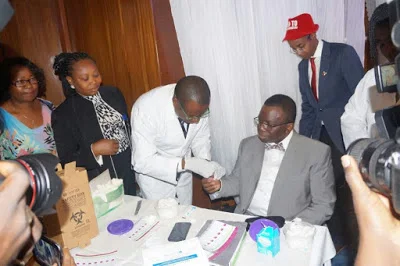A note of warning has come out from the national Agency for Food and Drugs Administration and Control concerning the imported Indian gari currently circulating in Nigerian markets. this is coming on the heels 0f several questions being thrown up about the nutritional value of the gari brand as well as the health implications of its consumers. ,
NAFDAC said contrary to reports, it did not register the
‘Indian garri’ that was reportedly being sold in the Nigerian market.
The agency’s Director, Special Duties and Media, Abubakar Jimoh, said this in an interview with the media, noting that there had been false reports that the agency registered the brand.
Nigerians had expressed concerns over the weekend when it was reported that ‘Indian’-packaged garri was being sold in the country. The garri was packed in a 500g bag, which had the picture of a lady and an inscription, ‘TRS’, on it. It also had a price tag of N450, according to reports.
NAFDAC said it immediately commenced investigations into the alleged importation of the “Indian garri”. The agency also cautioned Nigerians against consumption of the product.
Similarly, the Minister of Health, Isaac Adewole, spoke on the development in a statement on his verified twitter handle, noting that 26 packets of the product were seized for analysis by NAFDAC after regulatory officials visited the supermarket in Ikoyi on Monday.
While speaking with the media, Mr. Jimoh said that preliminary investigations revealed that the product was produced in UK, shipped to Ghana and now being sold in Nigeria.
He, however, said that the agency did not register the product as being insinuated.
“Let me make it clear again that NAFDAC did not register any garri,” he said.
On its own part, the Federal Ministry of Agriculture and Rural development says it will liaise with the National Agency for Food and Drug Administration and Control to investigate the alleged importation of garri from India.
The Minister of Agriculture and Rural Development, Chief Audu Ogbeh, who made this known, yesterday in Abuja, said that it is “strange and ridiculous” that garri would be imported when there is enough supply of cassava and garri in the country.
He said that the country produces more cassava than India, adding that Nigerians must change their attitude towards imported goods.He said, “Whoever buys that kind of garri should be blamed.
“I have heard of it. I will find out by tomorrow if NAFDAC indeed did certify any garri from India; unless it is some Indian companies packaging the garri here.
“Nigerians are too ready to buy anything imported. They will bring in apples and some of them have been preserved with ethanol which is not healthy for our consumption.
“Whoever is importing garri from India, something must be wrong with them. Why import garri when you do not know the conditions through which the garri was produced over there.
“I have no powers to stop imports, but I can recommend to the Nigerian Customs that this is unreasonable. I produce and encourage Nigerians to eat what they produce because it is safer for them.”
The agency’s Director, Special Duties and Media, Abubakar Jimoh, said this in an interview with the media, noting that there had been false reports that the agency registered the brand.
Nigerians had expressed concerns over the weekend when it was reported that ‘Indian’-packaged garri was being sold in the country. The garri was packed in a 500g bag, which had the picture of a lady and an inscription, ‘TRS’, on it. It also had a price tag of N450, according to reports.
NAFDAC said it immediately commenced investigations into the alleged importation of the “Indian garri”. The agency also cautioned Nigerians against consumption of the product.
Similarly, the Minister of Health, Isaac Adewole, spoke on the development in a statement on his verified twitter handle, noting that 26 packets of the product were seized for analysis by NAFDAC after regulatory officials visited the supermarket in Ikoyi on Monday.
While speaking with the media, Mr. Jimoh said that preliminary investigations revealed that the product was produced in UK, shipped to Ghana and now being sold in Nigeria.
He, however, said that the agency did not register the product as being insinuated.
“Let me make it clear again that NAFDAC did not register any garri,” he said.
On its own part, the Federal Ministry of Agriculture and Rural development says it will liaise with the National Agency for Food and Drug Administration and Control to investigate the alleged importation of garri from India.
The Minister of Agriculture and Rural Development, Chief Audu Ogbeh, who made this known, yesterday in Abuja, said that it is “strange and ridiculous” that garri would be imported when there is enough supply of cassava and garri in the country.
He said that the country produces more cassava than India, adding that Nigerians must change their attitude towards imported goods.He said, “Whoever buys that kind of garri should be blamed.
“I have heard of it. I will find out by tomorrow if NAFDAC indeed did certify any garri from India; unless it is some Indian companies packaging the garri here.
“Nigerians are too ready to buy anything imported. They will bring in apples and some of them have been preserved with ethanol which is not healthy for our consumption.
“Whoever is importing garri from India, something must be wrong with them. Why import garri when you do not know the conditions through which the garri was produced over there.
“I have no powers to stop imports, but I can recommend to the Nigerian Customs that this is unreasonable. I produce and encourage Nigerians to eat what they produce because it is safer for them.”



























